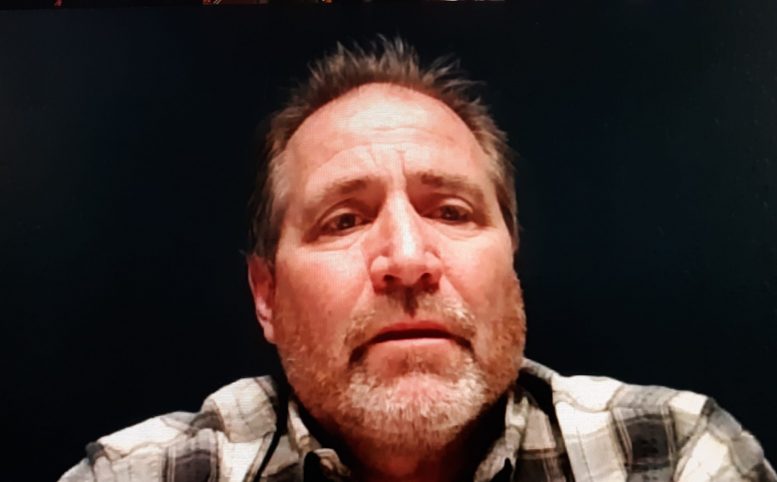By JAN LARSON McLAUGHLIN
BG Independent News
A detective on a FBI joint terrorism task force peeled back the curtain Tuesday on rising extremism in the U.S.
He revealed that most hateful acts don’t meet the criteria for terrorism. That some innocent looking symbols are signs of hate groups. And that for a small city, Bowling Green has been the scene for planning of two major terrorism attacks that were thwarted before they occurred.
Louis Espinosa, a detective with the Toledo Police Department assigned to the FBI terrorism task force for the past 15 years, spoke virtually during a community conversation on the rise of extremism, hosted by Not In Our Town BG.
“What I’m telling you is not watered down,” Espinosa said.
White supremacists and extreme right wing groups are currently the primary focus for domestic terrorism.
Other types of domestic terrorism include those who threaten or take action based on their extreme racial motivations, beliefs against abortion, support of animal or environmental rights, members of militias, sovereign citizens and involuntary celibate people.
“The FBI doesn’t investigate anyone because of their beliefs,” he said.
“But if you’re threatening to carry out violence,” that’s when officers snap to action. “When we get concerned is when they start blowing things up,” Espinosa said.
Animal rights supporters sometimes target labs, universities and private companies – sometimes resulting in more harm to the animals when they are released.
Environmental extremists often leave their protest areas worse off than before they arrived – such as at the Dakota Pipeline protest area, Espinosa said.
“These guys believe all organisms on earth are equal,” he said.
The state is a popular place for militias, according to the FBI.
“Ohio has a strong militia presence,” he said. “All they want to do is run around the woods and pretend they’re soldiers.”
Sovereign citizen extremists reject the legitimacy of U.S. citizenships and government authority, Espinosa said. They believe themselves immune from federal, state and local laws.
“They do not like police officers at all,” he said.
Antifa isn’t on the FBI list of designated terrorism organizations, but Espinosa noted that the organization is starting to arm itself in the face of other groups. He also said white supremicist groups are starting to protest alongside Antifa.
“They were not using weapons,” he said of Antifa, until they came up against groups like the Proud Boys.
The Proud Boys are “bitter enemies” with Antifa, Espinosa said. Though the Proud Boys often get lumped in with white supremacists, they are more motivated by their desires to keep women in the home.
“They have this fascination with housewives,” he said. “They are more male chauvinist pigs than anything.”
Other groups like the Boogaloo Bois are not designated as a terrorism group. That organization, Espinosa said, is anti-government, pro-gun, and far right.
“They want a second civil war,” he said. “They don’t like this government and they want to start over.”
And Involuntary Celibates are people angry about not being able to find sexual partners. They blame women and good-looking men for their lack of success, Espinosa said. “These guys are dangerous.”
Espinosa advised that people familiarize themselves with symbols used by extremist groups. For example, the numerals 14 and 88 are not celebrating NASCAR drivers.
While the first thought may be, “that’s a pretty bumper sticker,” people should be aware those numbers are symbols used by Nazi supporters. Really shiny black boots with white laces are also a Nazi trademark.
Boogaloo Bois are known for their floral Hawaiian shirts, and backpacks. Proud Boys use the symbol of a rooster surrounded by stars.
Though Bowling Green is not known for domestic terrorism activity, Espinosa noted two high profile cases in the last decade. The cases were the biggest for the FBI in this area, “and they both were in Bowling Green,” he said.
In 2012, an FBI raid uncovered a full arsenal of assault rifles, firearms, body armor and ammunition amassed by white supremacist Richard Schmidt in the Woodland Mall. Schmidt, who had a “sports zone” shop at the mall, was reportedly planning to carry out mass killings on African Americans and Jews. Investigators found a list of names and addresses of people to be assassinated, including the leaders of NAACP chapters in Michigan and Ohio.
“I was in that parking lot for months doing surveillance,” Espinosa said of the mall.
Espinosa said the case must have been a nightmare for Schmidt. “The prosecution was Jewish, and I’m Mexican,” he said.
The other case from 2018 involved Elizabeth LeCron and Vincent Armstrong. LeCron worked at a manufacturing plant in Bowling Green, and believed the plant was polluting the water. As well as an attack planned in Toledo, the pair had gas masks, screws, materials for making bombs and trenchcoats, and reportedly planned to blow up the BG plant.
The pair was infatuated with mass murderers like those at Columbine, Sandy Hook and Parkland.
“As sick as it is. The goal was to beat” the number killed by those shooters, Espinosa said.
LeCron reportedly traveled to Columbine to visit some of the places those killers stopped at before going to school She also became penpals with the killers from Parkland school and the Charleston church.
Espinosa said the FBI wants to hear about racist statements – with the understanding that the bureau may not be able to respond.
“First we’ve got to get people to speak up,” he said. “People are afraid to report stuff – but we want to hear it.”
More community conversations on extremism are planned by Not In Our Town BG, with the focus shifting to advice for families and schools, and then another for young people.

